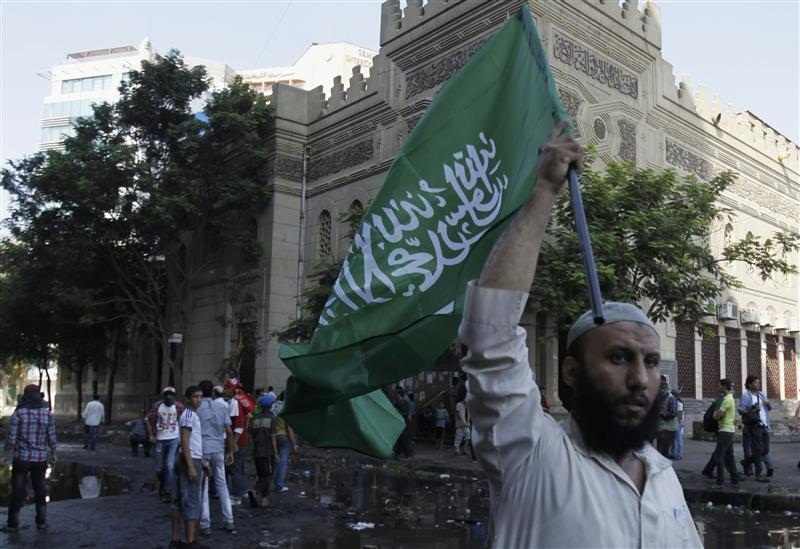Latest NEWS
- Aswat Masriya, the last word
- Roundup of Egypt's press headlines on March 15, 2017
- Roundup of Egypt's press headlines on March 14, 2017
- Former Egyptian President Hosni Mubarak to be released: lawyer
- Roundup of Egypt's press headlines on March 13, 2017
- Egypt's capital set to grow by half a million in 2017
- Egypt's wheat reserves to double with start of harvest -supply min
- Roundup of Egypt's press headlines on March 12, 2017
Egypt Islamist preachers say film makers deserve death

A protester waves a Saudi flag during clashes with riot policemen along a road which leads to the U.S. embassy, near Tahrir Square in Cairo September 14, 2012. Egyptian protesters angry at a film they say insults Prophet Mohammad hurled stones on Friday at a line of police in Cairo blocking their way to the U.S. embassy, which was attacked earlier this week - REUTERS/Amr Abdallah Dalsh
CAIRO, Sept 14 (Reuters) - Two Islamist preachers in Egypt told worshippers on Friday that those who made a movie deemed insulting to the Prophet Mohammad deserved to die under sharia (Islamic law) but they urged protesters not to take their anger out on diplomats or others.
Although the comments could be taken by some ordinary Muslims as an edict to take the law into their hands, many Egyptians believe that only the prestigious Al-Azhar mosque and seat of learning has the authority to issue decrees.
An Al-Azhar preacher on Friday said protests should be peaceful, a state newspaper reported.
Many Muslims deem it blasphemous to depict the Prophet in any form, and have been enraged by a movie made in the United States that portrayed him as a womaniser and religious fake, and protesters have stormed U.S. diplomatic missions in several Muslim countries.
"Those who produced the movie should be tried and killed," Mahmoud Shabaan, a sheikh from the ultra-orthodox Salafi school, told worshippers at Cairo's al-Nour mosque, citing actions by the Prophet's followers and Islamic teachings.
He also said the movie-makers should have a fair and urgent trial, adding that "nothing less than death was appropriate" for those who had insulted the Prophet.
At least one of the promoters of the film is an Egyptian Coptic Christian now living in America. Comments suggesting targeting those behind the film could stoke already heightened tensions between Muslims and Christians, who account for about 10 percent of Egypt's 83 million people.
Shabaan also said embassies and diplomats, as well as police, should not be attacked. "We should express our anger, but in a peaceful way that is governed by sharia," he said, after demonstrators scaled the U.S. embassy walls in Cairo this week, battling with police nearby since then.
MURSI CONDEMNS VIOLENCE
Those remarks echoed comments by Islamist President Mohamed Mursi, which he repeated again on a trip to Italy on Friday.
Mursi condemned insults to the Prophet but called for peaceful protests, condemned violence and said Egypt was committed to protecting embassies. He also condemned the killing of the U.S. ambassador in an attack by gunmen in Libya.
In Alexandria, Sheikh Ahmed Mahlawi said: "I demand retribution for those who insult the Prophet, peace and blessings upon him, and spilling their blood is a legal duty."
Youssry Hammad, spokesman for the Salafi al-Nour party, which secured a big bloc of seats in Egypt's parliamentary election, said the group rejected insults to the Prophet but also rejected any calls to kill the film producers.
"We also refuse any attacks on embassies," he said.
At Al-Azhar in Cairo, preacher Mohamed al-Mukhtar al-Mahdi condemned the film but told protesters not to use violence and said foreigners in Egypt should not be targeted and should be kept safe, the website of Al-Ahram newspaper said.
He also said companies that funded the movie should be tracked down and boycotted. Such calls for a boycott were echoed by others, with some calling for boycotting Western or Jewish products, an apparent response to some initial reports that Jewish donors had backed the film.
Jewish groups have condemned reports that they supported the film, CNN reported on its website.
The Salafi Call, an influential group of ultra-orthodox Salafi Muslim sheikhs, had on Wednesday called for suspending cooperation between the Egyptian and U.S. government until America "takes practical measures to stop this farce."
U.S. President Barack Obama's administration said it had nothing to do with the film and condemned it, but that it could not curb the constitutional right to free speech in the United States even if some views expressed might be offensive. (Reporting by Tamim Elyan, Mohamed Abdellah and Ahmed Tolba; Writing by Edmund Blair; Editing by Mark Heinrich)










